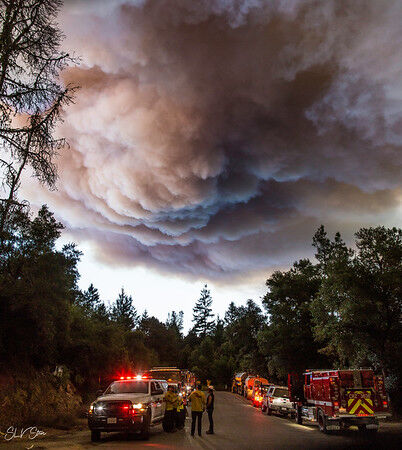COVID-19 and having to shelter-in-place was bad enough. Wearing a mask and closing up everything—restaurants, movie theaters, concert venues—that makes society enjoyable was bad enough. Students relegated to distance learning, sports seasons canceled, workers doing their jobs remotely or braving the possibility of contracting the virus was bad enough.
Then came the fires, fires that came raging over our hillsides and swooping into our communities, decimating our homes and neighborhoods. I raised my eyes heavenward and asked, “Isn’t it bad enough yet?”
Wechose to live in the Santa Cruz Mountains for its community-friendly approach to life, its mutual respect for nature and people, its beauty and its tranquility. Towering redwoods, woodpeckers, hillsides that develop waterfalls after heavy rains, firehouses that act as the community centers for holidays and celebrations—all of it melts together into an inviting, comfortable mix of small town living and tremendous heart. And we had to leave it all.
We were evacuated to all parts of the state and beyond. Thousands of us who had homes filled with memories and memorabilia, art projects from children and photo albums from weddings; door jambs marking the growth of our kids, and handmade mugs and bowls from ceramics classes. Porches and decks strewn with patio furniture, plants and bird feeders; couches that hosted sleepovers and nursing mothers; chairs that had been arranged with blankets and sheets into the perfect fort; kitchens that served thousands of meals and hosted even more family gatherings. Favorite pillows, favorite books, favorite everythings. All of us were—and still are—desperate to get back to whatever is left. Some will return to only ashes; others will return to homes damaged by smoke and water, stinking of spoiled food grown moldy in warm refrigerators.We will be grateful for even that.
We were evacuated from everything that was comforting and familiar and meaningful into the arms of families and friends and strangers and hotel staff who say they understand, but can they really? All of us hunkered down in hotels and campgrounds and the houses of others made to feel welcoming to us, somehow. And there are tears and worry, endless worry and what-ifs that are overwhelming and paralyzing and shared in online communities that are grieving losses we can’t yet articulate.
My daughter and I fled to Irvine as the evacuation order came through and the fires began coursing down the mountain toward our home in Felton.And though we were safe at the Embassy Suites, with air conditioning and comfy beds and two mini-fridges to hold our perishables, we didn’t want to be there. We were displaced from everything familiar, and feeling disjointed from the unknown that hovered over our heads. My daughter missed everything about home—her bed, her friends, her Schnookie, and especially her brother and father who are both firefighters and at risk on the fire line. She and I would vacillate between quiet acceptance and vocal opposition to our circumstances, but we always came back to understanding that we had no control over any of it.
After days of living in very close quarters, I briefly retreated to Kaiser to pick up prescriptions that I had left behind when we evacuated. When I got in my car, I noticed some ants. I turned on my air conditioning and it was like a confetti cannon—ants came flying out of the vents, pelting me and the inside of the car. I was Just. So. Done.
So done with everything being wrong. So done with overwhelming sadness and feeling like a lone reed against the tide. So done with being sad for my daughter who had been removed and isolated from everyone else that she knows and loves.
A perennially upbeat person, the Ant Confetti Episode™ was the last straw, and the tears flowed from a deep reservoir of grief that has been filling since February—a wellspring sculpted from loss and fear and helplessness. So much heaviness, so much yet unknown. That was my bottom.
Today, many of us have returned home, though many still have not. The community of Boulder Creek is reckoning with not only the loss of hundreds of homes, but also with damaged water infrastructure, and the uncertainty of when cleanup will be done, and what restoration of the area may look like. Firefighters from hundreds of other agencies have descended upon our valleys, and while PG&E is staged en masse at the Graham Hill Showgrounds, the streets of Scotts Valley are lined with fire trucks and engines that brought help from as far away as New Jersey. Signs of love and appreciation dot the landscape as locals share their gratitude for those who came to assist us in our time of need. Drivers honk, showing peace signs and yelling, “Thank you!” from open windows when driving by clusters of firefighters that are traversing the streets of Scotts Valley, looking for a little nourishment after endless hours of battling the blazes on our behalf.
These are trying times, and they will shape and define us. In 20 years, people will ask, “Were you living here when the CZU August Lightning Complex Fire ripped through the area?” And we will nod, and say, “Yes, and it made us who we are today.”
Not fire, not disease, not plagues of insects can take away our bravery, our purpose, our dedication to our community. They may transform and color our landscapes, but they will not dampen our drive for a better life, a truer love, a safer community. We will take a deep breath, wipe away the tears, and get to work building our kitchens and doorjambs and memories all over again. We are #SLVStrong.













